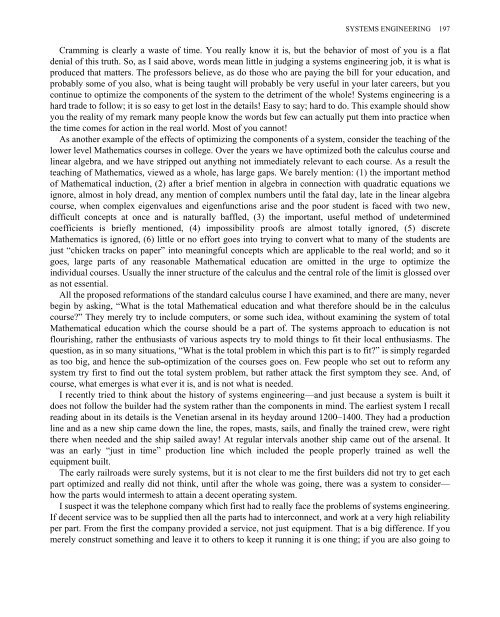hamming
hamming
hamming
Create successful ePaper yourself
Turn your PDF publications into a flip-book with our unique Google optimized e-Paper software.
SYSTEMS ENGINEERING 197Cramming is clearly a waste of time. You really know it is, but the behavior of most of you is a flatdenial of this truth. So, as I said above, words mean little in judging a systems engineering job, it is what isproduced that matters. The professors believe, as do those who are paying the bill for your education, andprobably some of you also, what is being taught will probably be very useful in your later careers, but youcontinue to optimize the components of the system to the detriment of the whole! Systems engineering is ahard trade to follow; it is so easy to get lost in the details! Easy to say; hard to do. This example should showyou the reality of my remark many people know the words but few can actually put them into practice whenthe time comes for action in the real world. Most of you cannot!As another example of the effects of optimizing the components of a system, consider the teaching of thelower level Mathematics courses in college. Over the years we have optimized both the calculus course andlinear algebra, and we have stripped out anything not immediately relevant to each course. As a result theteaching of Mathematics, viewed as a whole, has large gaps. We barely mention: (1) the important methodof Mathematical induction, (2) after a brief mention in algebra in connection with quadratic equations weignore, almost in holy dread, any mention of complex numbers until the fatal day, late in the linear algebracourse, when complex eigenvalues and eigenfunctions arise and the poor student is faced with two new,difficult concepts at once and is naturally baffled, (3) the important, useful method of undeterminedcoefficients is briefly mentioned, (4) impossibility proofs are almost totally ignored, (5) discreteMathematics is ignored, (6) little or no effort goes into trying to convert what to many of the students arejust “chicken tracks on paper” into meaningful concepts which are applicable to the real world; and so itgoes, large parts of any reasonable Mathematical education are omitted in the urge to optimize theindividual courses. Usually the inner structure of the calculus and the central role of the limit is glossed overas not essential.All the proposed reformations of the standard calculus course I have examined, and there are many, neverbegin by asking, “What is the total Mathematical education and what therefore should be in the calculuscourse?” They merely try to include computers, or some such idea, without examining the system of totalMathematical education which the course should be a part of. The systems approach to education is notflourishing, rather the enthusiasts of various aspects try to mold things to fit their local enthusiasms. Thequestion, as in so many situations, “What is the total problem in which this part is to fit?” is simply regardedas too big, and hence the sub-optimization of the courses goes on. Few people who set out to reform anysystem try first to find out the total system problem, but rather attack the first symptom they see. And, ofcourse, what emerges is what ever it is, and is not what is needed.I recently tried to think about the history of systems engineering—and just because a system is built itdoes not follow the builder had the system rather than the components in mind. The earliest system I recallreading about in its details is the Venetian arsenal in its heyday around 1200–1400. They had a productionline and as a new ship came down the line, the ropes, masts, sails, and finally the trained crew, were rightthere when needed and the ship sailed away! At regular intervals another ship came out of the arsenal. Itwas an early “just in time” production line which included the people properly trained as well theequipment built.The early railroads were surely systems, but it is not clear to me the first builders did not try to get eachpart optimized and really did not think, until after the whole was going, there was a system to consider—how the parts would intermesh to attain a decent operating system.I suspect it was the telephone company which first had to really face the problems of systems engineering.If decent service was to be supplied then all the parts had to interconnect, and work at a very high reliabilityper part. From the first the company provided a service, not just equipment. That is a big difference. If youmerely construct something and leave it to others to keep it running it is one thing; if you are also going to


